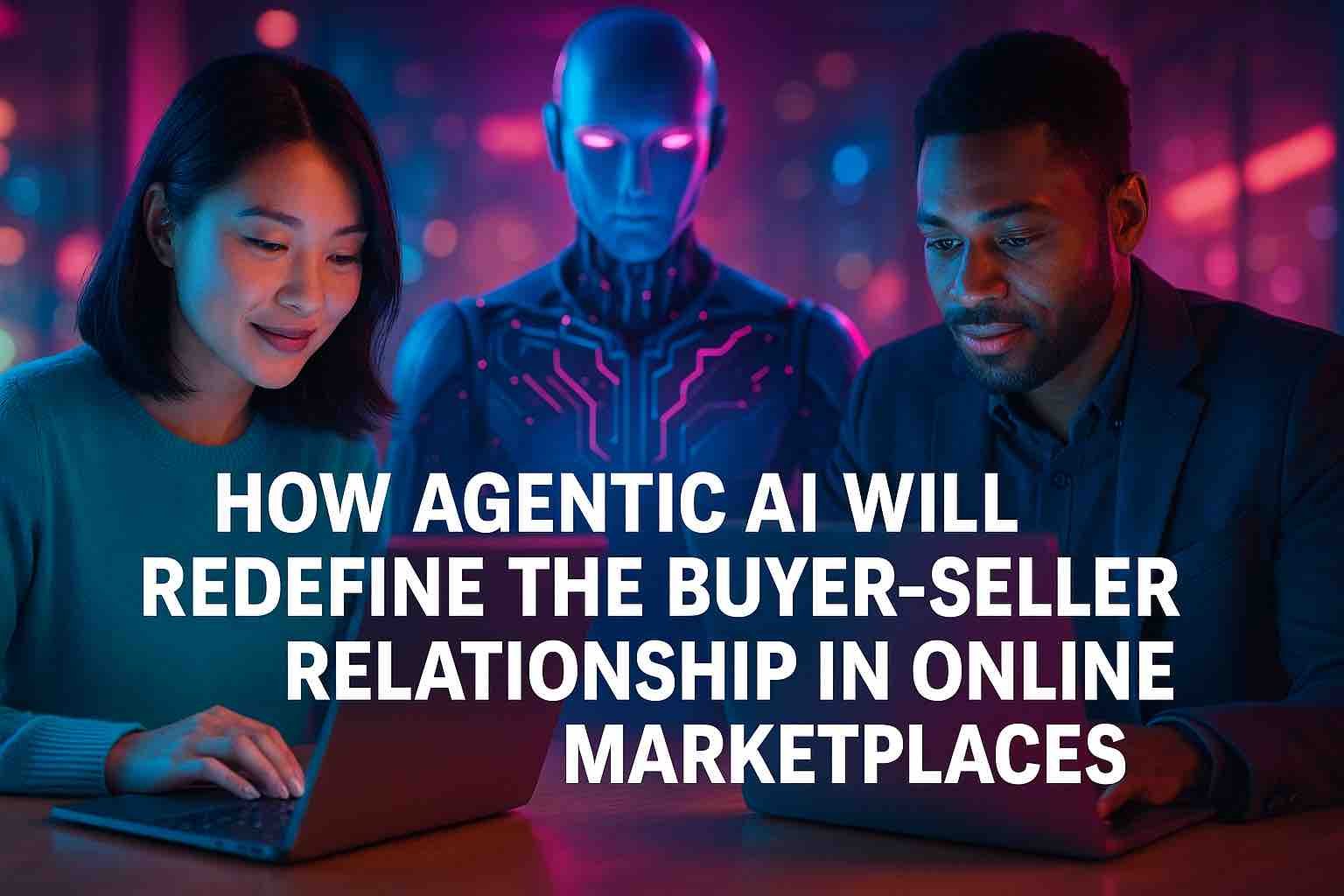

Introduction
In today’s digital economy, online marketplaces have become the backbone of modern commerce. From global e-commerce giants to niche property and automotive platforms, these ecosystems connect millions of buyers and sellers daily. Yet, the next big revolution is already underway — the rise of Agentic AI. These intelligent, goal-oriented systems will transform how interactions occur, driving efficiency, personalization, and automation across industries. This article explores ten leading marketplaces, each from a different sector, analyzing how they are changing commerce and how Agentic AI will redefine buyer–seller dynamics.
1. Amazon.com, Inc. (General E-Commerce)
Amazon dominates the global e-commerce landscape, boasting hundreds of millions of active users and billions in gross merchandise value (GMV). According to ChannelEngine, Amazon’s ecosystem connects millions of third-party sellers, supported by its vast logistics and cloud infrastructure.
With the adoption of Agentic AI, Amazon could move toward automated negotiation and personalized purchasing, where AI agents identify trends, manage inventory, and interact directly with consumers’ own digital assistants — reshaping how trust and loyalty are built.
2. eBay Inc. (Auctions & Resale Marketplace)
eBay pioneered online peer-to-peer auctions and remains a hub for collectibles, electronics, and refurbished goods. Its flexible format — combining auctions and fixed pricing — enables diverse seller types to reach global buyers. (Shopify)
As Agentic AI spreads, buyer agents could automatically monitor auctions, assess pricing, and bid autonomously. Sellers, in turn, may use AI agents to manage inventory, optimize timing, and target buyers with predictive insights, streamlining negotiation and reducing manual listing work.
3. Etsy, Inc. (Handmade & Creative Goods)
Etsy stands apart as the go-to marketplace for handmade and vintage goods, connecting artisans with global audiences. The platform emphasizes authenticity and creativity, with millions of independent sellers. (Forbes)
In the near future, Agentic AI could personalize shopping experiences by learning buyer preferences in aesthetics or materials, recommending products, or even initiating custom orders autonomously. Seller agents could handle logistics, marketing, and chat interactions, freeing artisans to focus on craftsmanship.
4. Upwork Inc. (Freelance Services)
Upwork connects freelancers with clients seeking professional services across design, writing, development, and consulting. The platform manages contracts, payments, and collaboration. (Oyelabs)
Integrating Agentic AI can automate matching — allowing AI agents to pre-screen proposals, assess fit, and negotiate scope or pricing. This evolution enhances transparency and reduces hiring friction, but raises questions about bias, accountability, and data ethics when agents negotiate work on behalf of humans.
5. Chairish, Inc. (Luxury Home Furnishings)
Chairish specializes in vintage furniture and fine art, offering high-value curation for buyers seeking unique home decor. (Wikipedia) Its business model relies on commission-based listings and strong visual presentation.
Incorporating Agentic AI could bring concierge-style shopping — where buyer agents act as digital stylists, suggesting pieces that complement interior designs, while seller agents manage provenance, pricing, and authentication. This AI-driven personalization enhances buyer trust and seller reach.
6. DHgate.com (B2B Cross-Border Commerce)
DHgate is a China-based B2B and B2C platform connecting global buyers with manufacturers. With millions of users across 200+ regions, it simplifies bulk sourcing and international trade. (Wikipedia)
By embedding Agentic AI, DHgate can streamline procurement — automating supplier verification, logistics coordination, and contract negotiation. AI agents could simulate trade-show interactions digitally, building efficient, cross-language commerce between businesses worldwide.
7. Flipkart (E-Commerce in India)
Flipkart, now majority owned by Walmart, is India’s largest e-commerce platform, hosting a vast range of categories from electronics to groceries. Its deep localization makes it a powerful player in emerging markets.
The integration of Agentic AI could help tailor user journeys across India’s linguistic and cultural diversity. Buyer agents might manage reorders, handle warranty claims, and track deliveries; seller agents could optimize stock, respond to market changes, and analyze consumer sentiment in real time.
8. BloomNation (Local Services Marketplace)
BloomNation empowers local florists to sell arrangements through a unified platform serving thousands of cities across the U.S. It emphasizes creativity and local artistry.
Through Agentic AI, florist agents could anticipate seasonal trends, manage delivery routes, and auto-coordinate events. Buyer agents could schedule recurring orders for holidays or corporate gifting, creating a seamless local-to-digital experience. The result: automation that amplifies — not replaces — human creativity.
Applications in Healthcare Marketplaces
The healthcare and medtech sectors are poised for massive transformation through agentic systems. In digital health tech marketplaces, AI agents could autonomously match patients with providers, coordinate telehealth appointments, and manage insurance verification. For sellers (clinics or pharma firms), these systems may handle compliance workflows, predictive diagnostics, and pricing optimization — enhancing care delivery efficiency.
Conclusion
From global e-commerce to regional property and auto trading, the infusion of Agentic AI is redefining buyer–seller relationships across every vertical. Buyers gain faster, smarter, more personalized experiences. Sellers enjoy precision targeting, automation, and operational efficiency. Yet, trust and transparency remain essential — as transactions evolve into AI-to-AI interactions, marketplaces must ensure fairness, accountability, and human oversight.
The next generation of online marketplaces won’t just connect people; they’ll connect intelligent systems working on their behalf — ushering in an era of autonomous, human-aligned digital commerce.
FAQs:
1. What is Agentic AI?
Agentic AI refers to autonomous, goal-driven artificial intelligence systems capable of acting proactively to achieve objectives without continuous human input. Unlike traditional automation, agentic AI agents can negotiate, plan, and make decisions — making them ideal for online marketplaces where both buyers and sellers benefit from faster, smarter transactions.
2. How will Agentic AI change online marketplaces?
Agentic AI will fundamentally shift marketplaces from human-driven to agent-driven interactions. Buyer-agents can automatically find products, negotiate with seller-agents, and finalise purchases. Sellers will optimise listings and pricing dynamically through intelligent systems. This change enhances speed, efficiency, and personalisation, reducing human friction in commerce. (Forbes)
3. What are examples of marketplaces likely to adopt Agentic AI first?
Large e-commerce and freelance platforms such as Amazon, Upwork, and eBay are expected to adopt agentic AI early due to their data volume and automation readiness. These systems can help personalise shopping, streamline logistics, and optimise pricing dynamically.
4. How does Agentic AI affect trust between buyers and sellers?
While agentic AI reduces transaction friction, it raises new trust challenges. Buyers must ensure their agents act ethically and transparently, while sellers need to verify that agent-negotiated deals are legitimate. Marketplaces will need to build “agent verification” and transparency protocols to maintain user trust. (arXiv.org)
5. How will healthcare and medtech marketplaces use Agentic AI?
In healthcare and medtech marketplaces, agentic AI could autonomously schedule consultations, match patients with providers, optimise treatment logistics, and handle insurance pre-approvals. It will enhance speed and accessibility while maintaining compliance and safety through human oversight.
6. What are the risks of over-automation with Agentic AI?
Excessive reliance on agentic AI may erode human connection in markets where personal touch matters, such as craft goods or local services. It may also lead to opaque decision-making or bias in automated negotiations. Transparency and human-in-the-loop design will be essential safeguards. (Medium)
7. How can sellers prepare for the rise of Agentic AI buyers?
Sellers should optimise listings with machine-readable data, open APIs, and standardised pricing logic so that buyer-agents can interpret and negotiate effectively. They should also implement agent-friendly verification systems to ensure smooth communication with intelligent buyer agents. (SupplyChainDigital)
8. How will Agentic AI improve global B2B marketplaces like DHgate?
Platforms like DHgate can use agentic AI to manage supplier discovery, cross-border contract negotiation, shipping coordination, and customs compliance. By letting agents handle these processes, B2B buyers and sellers can complete complex global deals faster and more accurately.
9. What is the long-term impact of Agentic AI on the buyer–seller relationship?
Over time, agentic AI will transform the buyer–seller relationship from direct communication to agent-to-agent ecosystems. Humans will focus on strategy, creativity, and trust, while agents handle execution. The relationship won’t disappear — it will evolve into a seamless hybrid model balancing automation and human oversight. (Wikipedia)
References
-
ChannelEngine. “Top 20 ecommerce marketplaces in the world in 2025.” https://www.channelengine.com/en/blog/worlds-top-marketplaces ChannelEngine
-
a16z. “Marketplace 100: 2023.” https://a16z.com/marketplace-100/ Andreessen Horowitz
-
MultiMerch. “50+ Popular Online Marketplaces and Two-Sided Platforms.” https://multimerch.com/blog/popular-online-marketplaces/ MultiMerch Marketplace
-
Taxually. “The Top 13 Online Marketplaces for US Sellers in 2025.” https://www.taxually.com/blog/the-top-13-online-marketplaces-for-us-sellers-in-2025/ Taxually
-
WebInterpret. “Top 10 online marketplaces: leading ecommerce platforms.” https://webinterpret.com/en/blog/top-online-marketplaces Webinterpret
-
Wikipedia. “List of online marketplaces.” https://en.wikipedia.org/wiki/List_of_online_marketplaces Wikipedia
-
Nomtek. “Different Types of Online Marketplaces and Monetization.” https://www.nomtek.com/blog/mobile-commerce nomtek.com
-
Wikipedia. “DHgate.com.” https://en.wikipedia.org/wiki/DHgate.com Wikipedia
-
Wikipedia. “Chairish.” https://en.wikipedia.org/wiki/Chairish Wikipedia
-
Upwork website. “How does Upwork work.” https://www.upwork.com/resources/freelance-marketplace Upwork
-
Forbes article on Etsy. “Etsy doubles down on handmade to build a moat around its marketplace.” https://www.forbes.com/sites/pamdanziger/2024/07/13/etsy-doubles-down-on-its-maker-mission-to-build-a-moat-around-its-marketplace/ Forbes
-
Wikipedia. “Flipkart.” https://en.wikipedia.org/wiki/Flipkart Wikipedia
-
Wikipedia. “BloomNation.” https://en.wikipedia.org/wiki/BloomNation Wikipedia













